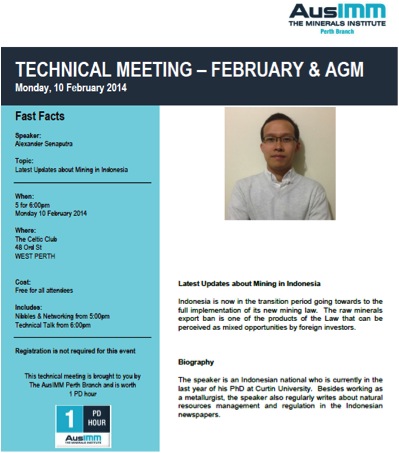In my previous two articles, I have discussed things that are relevant to: (1) funding and (2) finding the “right” academic supervisor. In this article, I would like share my experience about English. I have to confess that my English is not that good, it is because I am a late user of English. I came to Australia not long after I completed my Bachelor degree in Indonesia and people say the older you learn a new language, the harder it gets for you. That also applies to me. However, that does not limit me in doing well in my studies and more importantly getting a good job.
Before you enrol yourself in an Australian university, you must pass an internationally recognised English test such as International English Language Testing System (IELTS). Even if you don’t pass the minimum score, sometime your school let you do a short course with their internal testing system. Once you immerse yourself in an English-speaking environment, normally you will pass that internal testing system. As postgraduate research students (Master by Research or PhD students), you are required to use English for different purposes other than just a daily communication tool – such as explaining complex scientific phenomena to your professors/colleagues or writing peer-reviewed articles. Those tasks are actually not easy, especially if English is not your first language. However, you will be able to get some help from the university.
Aid from university
As far as I know, every university in Australia has a teaching and learning centre where everyone can seek assistance to improve their skills, including their English language. Curtin University, the place where I was doing my PhD, offers various workshops to their students, which aim to improve speaking and writing skills of the students with non-English backgrounds. These workshops are held regularly so if you miss one this semester, you can always enrol next semester. The workshops are sometimes divided in stages (e.g. beginner, intermediate or advanced) so that you can start at the level where you are at the moment.
In addition, university usually makes those workshops free as long as you’re enrolled as a student there. If you are about study in Australia, make sure that you know what the services available for you to improve your English. However, note that those workshops are not running everyday. Although we learn a lot of tips and tricks, we still need practices. I have seen some friends who are involved in social activities such as student union so that they can practice their English in regular basis. In my case, I spent my free time earning extra money to cover one semester in my PhD that was not paid by my scholarship and also to learn another subject by myself. Thus, I did not have a lot of free time as others did.
Bring a paper and a pen
What I do have is a pen and a piece of paper with me wherever I go. Sometimes, it is very hard for me to explain few things related to the chemical experiments that I did. Thus, I often explain them by drawing it. In that case, the take-home message will be easily delivered. I also still remember the very first few months in my PhD where I cannot understand almost all the things that my Professor explained to me. Not only that he spoke fastly, he also used terminologies I didn’t understand at that time. So I wrote down a few keywords and terms that I could extract from our discussion. As soon as our discussion was finished, I started to search the meaning of those terms.
Those were the stories how I struggled with English. Until now, I am still learning to speak English fluently and write flawlessly. I have to admit that I had two Professors who patiently helped me with my writing. However, when it comes to presenting my research in front of audiences, I cannot fully rely on them. At the same time, I never waste any opportunity where I am invited to speak about my work. I am actually one of the youngest persons ever invited to become a single speaker in the mining professionals forum in Western Australian (see picture below)– an opportunity normally given to professors or practitioners with more than 20 years of working experience. I eventually came up with some presentation tricks that can win the heart of the audiences.
Ps. Stay tuned as that will be my next article at Indonesia Mengglobal!










